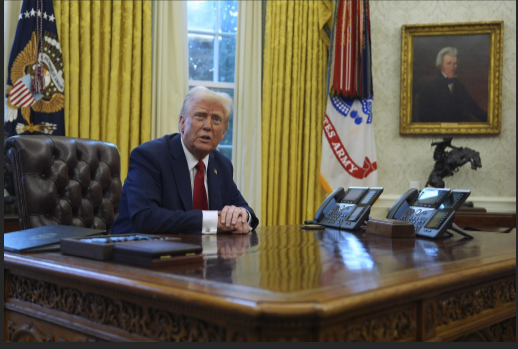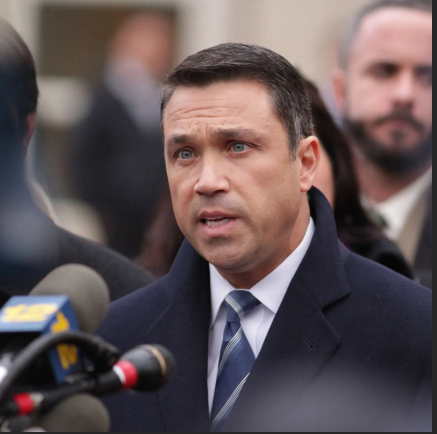In a sweeping round of clemency decisions, former U.S. President Donald Trump has commuted the federal prison sentence of Larry Hoover, the founder of the infamous Gangster Disciples gang, sparking renewed debate over the power and reach of presidential pardons.
Trump has commuted the sentence of Larry Hoover pic.twitter.com/KKcKTTilqk
— SAY CHEESE! 👄🧀 (@SaycheeseDGTL) May 28, 2025
Hoover, 74, is serving multiple life sentences on federal charges including conspiracy, extortion, and drug trafficking. Although Trump’s commutation affects only his federal sentence, Hoover remains incarcerated under a separate 200-year state sentence in Illinois for a 1973 murder conviction. Presidential clemency powers do not extend to state-level cases, meaning Hoover will remain behind bars unless Illinois authorities act to reduce or overturn his remaining sentence.
Trump’s decision was part of a broader clemency spree, with more than two dozen individuals receiving pardons or sentence commutations this week. According to the New York Times, at least 25 people benefited from the latest round of presidential mercy.

A Complex Legacy
Larry Hoover’s name has long been synonymous with gang violence in Chicago. Emerging from the South Side in the 1970s, the Gangster Disciples under his leadership grew into a powerful and feared nationwide street gang. In the 1990s, Hoover attempted to rebrand the organization as “Growth and Development,” a social movement claiming to focus on community upliftment. Authorities, however, were unconvinced. Hoover was convicted in 1997 of continuing to direct gang operations from prison and was given multiple life sentences in a high-profile federal case.
Also Read: Andrew and Tristan Tate to Face 21 Criminal Charges in UK After Romanian Proceedings Conclude
In recent years, Hoover has publicly renounced gang activity and advocated for criminal justice reform. He voiced support for the First Step Act, a bipartisan bill signed into law by Trump in 2018 aimed at reducing recidivism and providing inmates with opportunities for early release through rehabilitation programs.
“I am no longer a member, leader, or even an elder statesman of the Gangster Disciples,” Hoover wrote in a letter to a federal court in 2022. “I want nothing to do with it now and forever.” Despite his statements, federal prosecutors as recently as 2021 argued Hoover continued to exert influence over gang members from within prison walls, citing intercepted communications and inmate reports.
Following the news of Trump’s commutation, Hoover’s attorney Justin Moore wrote, “We got Larry Hoover out of federal prison – when many said it was impossible. Now Illinois must send him home for good.”
Pardons Reach Beyond Hoover
Trump’s recent clemency actions extended far beyond Hoover. Among those receiving full pardons were several high-profile individuals, including former politicians and celebrities.

Michael Grimm, a former Republican congressman from New York, received a pardon after previously serving a seven-month sentence for felony tax fraud. Grimm had admitted to concealing over $900,000 in income related to a Manhattan restaurant he owned.
Former Connecticut Governor John Rowland was also pardoned. Rowland served time for campaign finance violations and obstruction charges stemming from secret payments during his tenure.
The clemency list also included rapper Kentrell Gaulden, better known as NBA YoungBoy. Gaulden has faced multiple charges over the years involving drugs, firearms, and fraud. Trump’s decision to grant him a pardon comes amid growing attention from hip-hop artists and activists who have campaigned for Gaulden’s release.
Other names on the list include convicted fraudster Kevin Eric Baisden and military officer Mark Bashaw, who was court-martialed for disobeying COVID-19 health protocols.
In a case that drew both criticism and curiosity, Trump also pardoned two men—Tanner Mansell and John Moore—convicted of theft at sea. The pair had released sharks they mistakenly believed were being poached, only to later learn the fish were part of a legal marine research operation.
Michael Harris, co-founder of the iconic Death Row Records label, received a full pardon as well. Harris, who was originally granted a sentence commutation during Trump’s first term, had been serving time for serious drug-related offenses before transitioning to prison mentorship work.
Political Undertones and Future Implications
Critics argue that Trump’s latest wave of clemency decisions is both politically motivated and personally calculated, with a number of recipients connected to causes or individuals close to the former president. Among the more controversial statements, Trump commented that he would consider pardoning men convicted of plotting to kidnap Michigan Governor Gretchen Whitmer in 2020, claiming their trial appeared unfair.
“I did watch the trial,” Trump remarked. “It looked to me like somewhat of a railroad job.”
This wave of clemency adds to Trump’s already extensive use of presidential pardon powers. According to Department of Justice records, Trump has issued more than 40 pardons during his second term alone. That’s in addition to over 1,600 pardons previously granted to individuals involved in or charged in relation to the January 6 Capitol riot.
As the political landscape continues to shift ahead of the 2026 midterm elections, Trump’s use of clemency may remain a contentious topic, with supporters praising his commitment to criminal justice reform and opponents criticizing what they view as a misuse of executive privilege.












